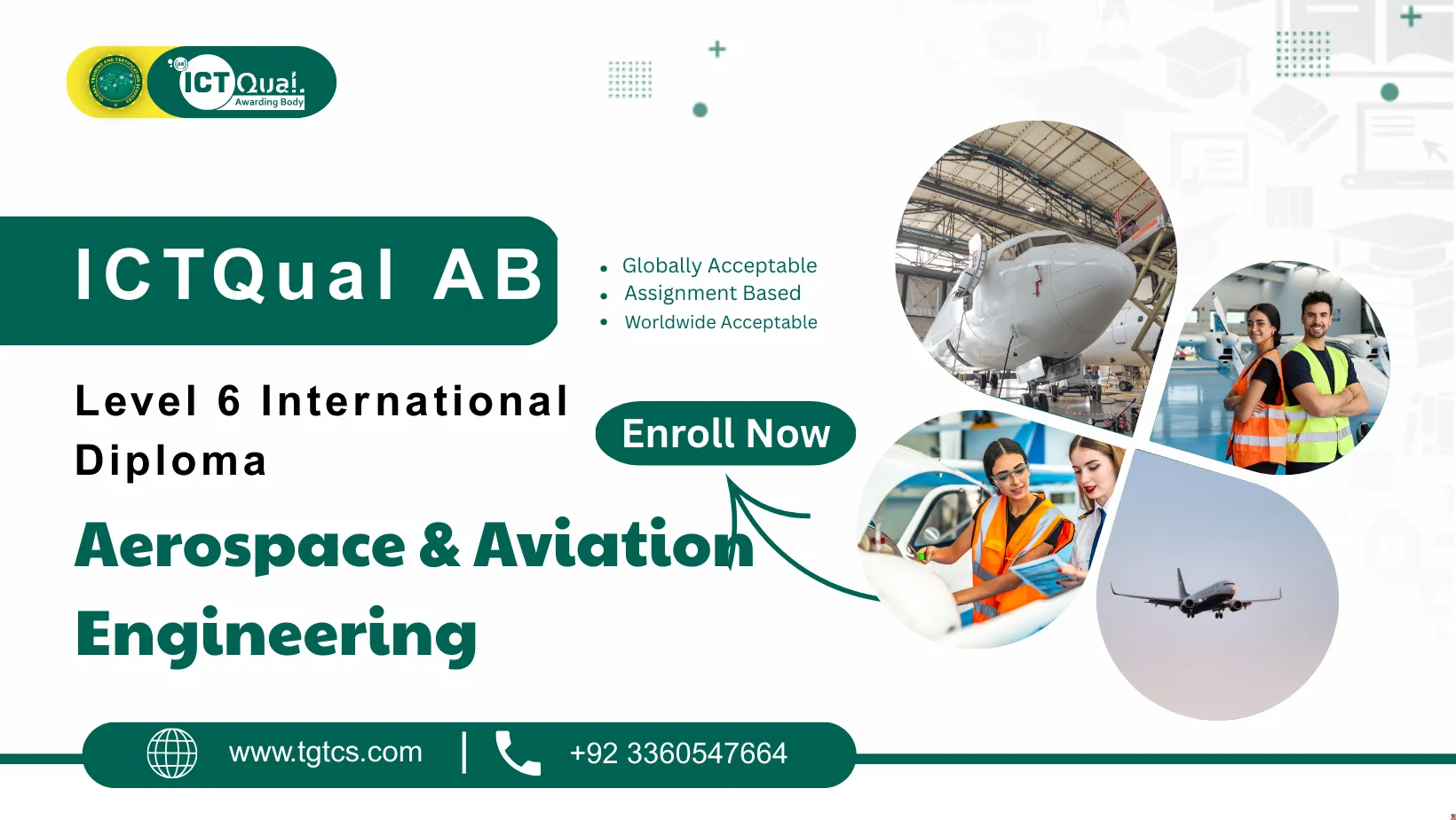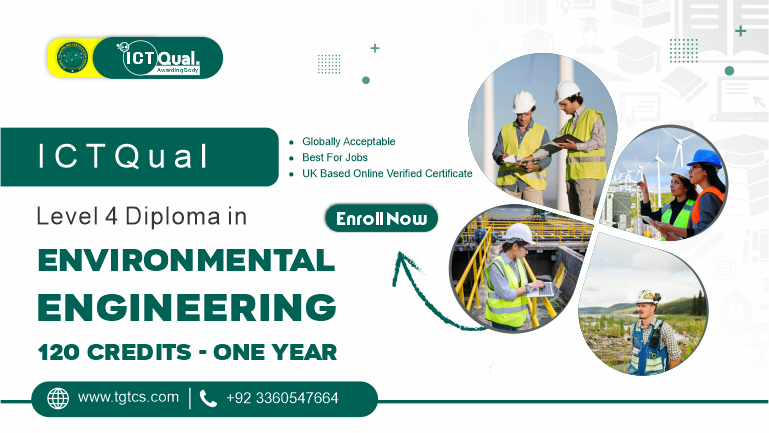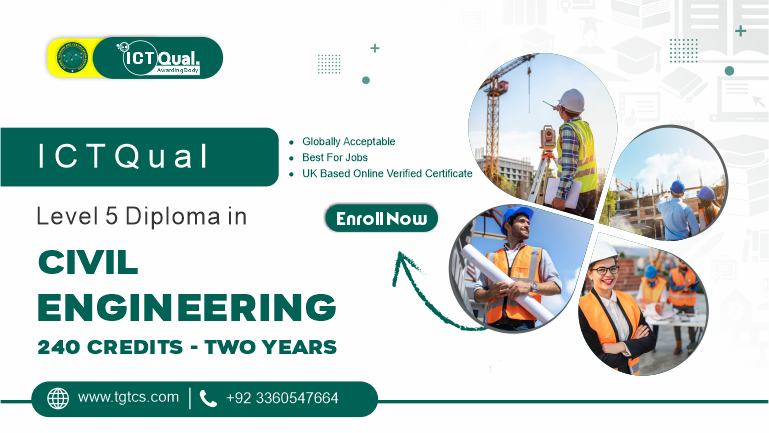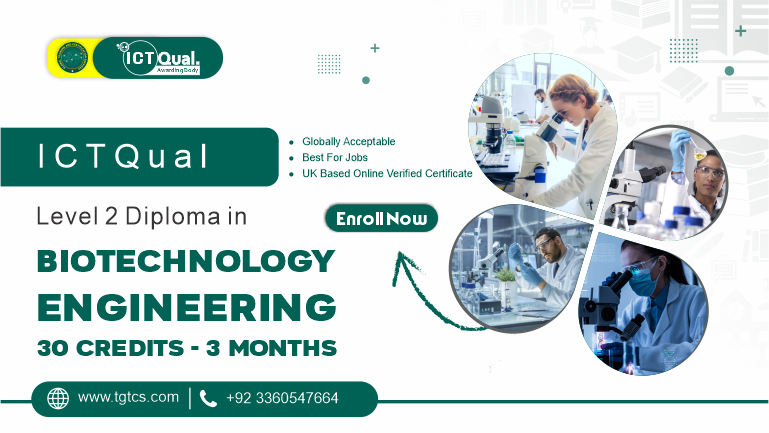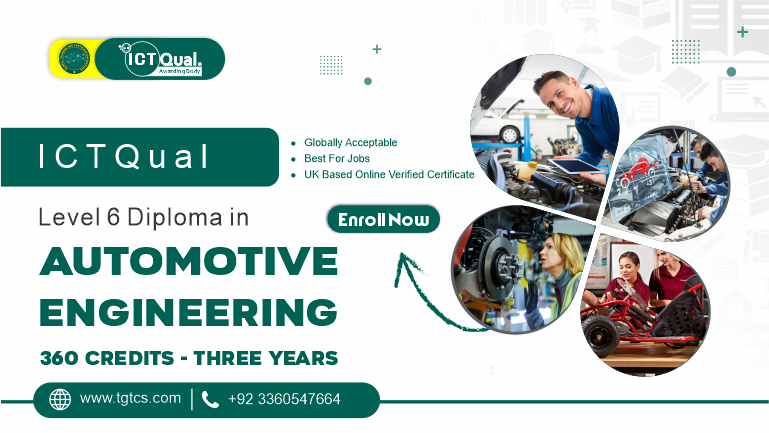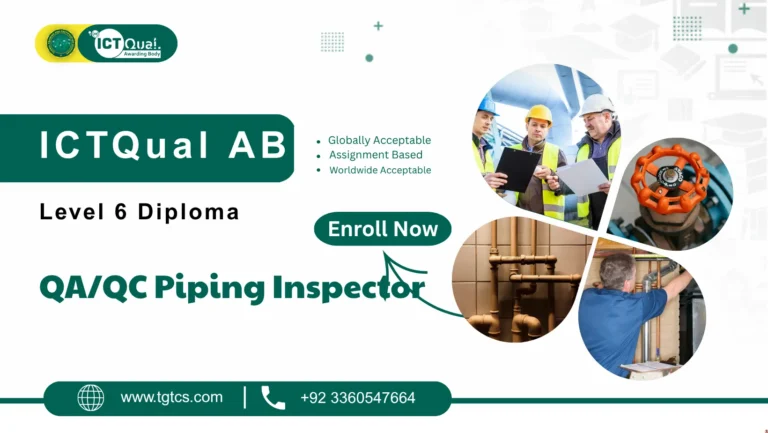ICTQual AB Level 6 International Diploma in Aerospace and Aviation Engineering
The ICTQual AB Level 6 International Diploma in Aerospace and Aviation Engineering is a globally recognized qualification designed to equip learners with advanced technical knowledge and practical expertise essential for a successful career in the aerospace and aviation industry. With rapid advancements in aircraft design, aviation technology, and aerospace systems, professionals with specialized skills are in high demand worldwide. This diploma bridges the gap between theoretical understanding and real-world applications, preparing learners for complex engineering challenges.
The purpose of this course is to provide comprehensive coverage of aerospace engineering principles, aircraft systems, aerodynamics, propulsion technologies, avionics, and aviation management. Learners will also gain insights into aviation safety standards, regulatory compliance, and emerging technologies such as UAVs, autonomous flight systems, and smart aircraft maintenance. By combining engineering fundamentals with applied aerospace practices, this diploma ensures learners are equipped with both the knowledge and the hands-on skills needed to excel in the aviation sector.
Students will develop expertise in aircraft design, propulsion and power systems, structural analysis, flight mechanics, and maintenance management. Practical applications include aircraft performance evaluation, system integration, aerospace project management, and innovation in aviation technology. Additionally, learners enhance critical thinking, problem-solving, and decision-making skills, enabling them to lead projects and contribute strategically to aerospace organizations.
This diploma is ideal for aspiring aerospace engineers, aviation professionals, technical managers, and innovators seeking internationally recognized credentials to advance their careers in the aerospace and aviation industry. By completing this qualification, learners gain a globally respected, British Council verifiable, MOFA and Embassy attestable certification, enhancing career opportunities, employability, and professional credibility in the aviation sector.
The Global Training and Certification Services is Approved Training Centre of ICTQual AB UK Ltd
Course Level and Credits
The ICTQual AB Level 6 International Diploma in Aerospace and Aviation Engineering is a prestigious qualification offering 360 credits, reflecting its comprehensive curriculum and advanced level of study. This fully assignment-based program ensures learners gain an in-depth understanding of aerospace engineering principles, aviation operations, aircraft systems, and modern aerospace technologies. The Level 6 diploma is internationally recognized, making it a highly respected credential for professionals aiming to enhance their academic and career profile in the global aerospace and aviation industry.
Mode of Study
This diploma offers flexible, self-paced learning that allows learners to study from anywhere in the world, accommodating the needs of working professionals, international students, and those balancing personal commitments. The fully assignment-based structure eliminates the need for rigid classroom schedules, providing learners the freedom to progress through the modules at their own pace while applying theoretical knowledge to practical scenarios. This flexibility ensures a seamless learning experience, making it easier for candidates to complete the diploma without geographical or time constraints.
Global Recognition & Attestation
The ICTQual AB Level 6 International Diploma in Aerospace and Aviation Engineering is globally recognized and verifiable through the British Council. Additionally, it is MOFA and Embassy attested, which makes it highly valuable for employment, professional development, and iqama approval in Gulf countries. This international validation ensures that graduates’ qualifications are credible and recognized by employers, regulatory authorities, and academic institutions worldwide, opening doors to career opportunities across multinational aviation companies, aerospace organizations, and defense industries.
Eligibility and Flexibility
This qualification is suitable for both fresh graduates and experienced professionals seeking to advance their careers. Fresh learners are required to complete all 36 mandatory assignments within three years, providing a structured pathway to acquire the full range of skills and knowledge. Experienced professionals with a minimum of six years of verifiable relevant experience can fast-track the diploma by demonstrating their expertise in professional discussion meetings with an ICTQual AB approved assessor, bypassing the need to complete all assignments. This flexible pathway allows skilled individuals to gain recognition quickly while validating their practical experience.
Skills and Knowledge Gained
Learners of this diploma acquire a comprehensive set of technical and professional skills, including aircraft design, aviation safety management, aerodynamics, propulsion systems, and aerospace project management. In addition, the program covers modern aviation technologies, maintenance procedures, and operational efficiency strategies. By combining theoretical knowledge with practical applications, the diploma prepares learners to handle modern aerospace challenges efficiently and innovate within their organizations.
Career Benefits
Graduates of the ICTQual AB Level 6 International Diploma in Aerospace and Aviation Engineering are equipped for high-demand roles across the global aviation and aerospace industry. Career opportunities include aerospace engineer, aircraft maintenance manager, aviation operations consultant, flight systems specialist, and aerospace project leader, among others.
Mandatory Unit
This qualification, the ICTQual AB Level 6 International Diploma in Aerospace & Aviation Engineering, consists of 36 mandatory units.
Year 1 – Foundation in Aerospace & Aviation Engineering
- Principles of Aerospace and Aviation Engineering
- Engineering Mathematics
- Fundamentals of Mechanical and Electrical Engineering
- Materials Science and Engineering
- Engineering Drawing and Computer-Aided Design (CAD)
- Introduction to Aerodynamics and Flight Mechanics
- Basics of Propulsion Systems
- Aircraft Structures – Fundamentals
- Avionics and Electrical Systems – Basics
- Health, Safety, and Environmental Practices in Aviation
- Communication and Technical Report Writing
- Introduction to Project Management in Engineering
Year 2 – Intermediate Studies in Aerospace & Aviation Engineering
- Aerodynamics and Fluid Dynamics – Applications
- Propulsion Systems and Gas Turbine Engines
- Aircraft Structural Analysis and Design
- Avionics and Navigation Systems
- Flight Mechanics and Performance Analysis
- Aerospace Materials and Manufacturing Processes
- Aircraft Maintenance and Reliability Engineering
- Systems Engineering in Aerospace Projects
- Unmanned Aerial Vehicles (UAV) – Fundamentals
- Sustainable Aviation and Green Technologies
- Applied Research Methods in Aerospace Engineering
- Project Planning and Aviation Operations Management
Year 3 – Advanced Studies in Aerospace & Aviation Engineering
- Advanced Aerodynamics and Computational Fluid Dynamics (CFD)
- Advanced Propulsion and Rocket Systems
- Advanced Structural Analysis and Composite Materials
- Flight Control Systems and Automation
- Space Systems Engineering and Satellite Technology
- Robotics and Autonomous Systems in Aviation
- Smart Aviation Technologies and Industry 4.0
- Aviation Safety, Risk, and Quality Management
- Cyber-Physical Systems and IoT in Aerospace Engineering
- Professional Ethics and Sustainability in Aerospace Engineering
- Innovation, Entrepreneurship, and Aviation Business Development
- Final Year Major Project (Capstone Project)
The ICTQual AB Level 6 International Diploma in Aerospace and Aviation Engineering equips learners with a comprehensive set of knowledge and skills across foundational, intermediate, and advanced areas of aerospace and aviation. Each unit is designed to ensure practical competence, technical expertise, and industry readiness, preparing graduates for a wide range of professional roles in the global aerospace sector.
Year 1 – Foundation in Aerospace & Aviation Engineering
Principles of Aerospace and Aviation Engineering
- Understand core concepts and principles of aerospace and aviation engineering.
- Analyze the evolution and applications of aerospace technologies.
- Explore the roles and responsibilities of aerospace engineers in global industries.
- Apply fundamental engineering principles to aviation systems.
Engineering Mathematics
- Solve complex mathematical problems relevant to aerospace engineering.
- Apply calculus, algebra, and differential equations in engineering contexts.
- Use mathematical models to analyze flight dynamics and propulsion systems.
- Interpret statistical data for aerospace research and operations.
Fundamentals of Mechanical and Electrical Engineering
- Understand mechanical systems and their role in aircraft performance.
- Explore electrical circuits and systems used in aviation applications.
- Analyze the integration of mechanical and electrical systems in aircraft.
- Apply theoretical knowledge to practical engineering problem-solving.
Materials Science and Engineering
- Identify aerospace materials and their mechanical properties.
- Evaluate material selection for aircraft structures and components.
- Understand the impact of temperature, stress, and fatigue on materials.
- Apply material science principles to design safe and efficient aircraft systems.
Engineering Drawing and Computer-Aided Design (CAD)
- Develop technical drawing skills for aerospace components.
- Use CAD software to design and model aircraft parts.
- Interpret engineering drawings for manufacturing and assembly.
- Apply 2D and 3D modeling techniques to practical aerospace problems.
Introduction to Aerodynamics and Flight Mechanics
- Understand the fundamental principles of aerodynamics.
- Analyze forces affecting aircraft during flight.
- Explore flight stability, control, and maneuverability concepts.
- Apply basic flight mechanics to aircraft design and performance.
Basics of Propulsion Systems
- Understand the principles of aircraft propulsion.
- Explore different types of engines used in aerospace applications.
- Analyze engine performance parameters and efficiency.
- Apply basic propulsion knowledge to aircraft design considerations.
Aircraft Structures – Fundamentals
- Understand primary and secondary aircraft structures.
- Analyze load-bearing components and stress distribution.
- Explore design principles for lightweight and durable aircraft structures.
- Apply structural fundamentals to practical aerospace scenarios.
Avionics and Electrical Systems – Basics
- Understand aircraft avionics systems and their applications.
- Explore basic electrical and instrumentation systems in aviation.
- Analyze the integration of avionics for flight control and navigation.
- Apply electrical principles to ensure operational safety and efficiency.
Health, Safety, and Environmental Practices in Aviation
- Understand aviation safety regulations and environmental policies.
- Apply risk assessment techniques to aviation operations.
- Explore sustainable practices and environmental impact mitigation.
- Promote safety culture and regulatory compliance in aerospace workplaces.
Communication and Technical Report Writing
- Develop technical writing skills for aerospace documentation.
- Prepare professional reports and presentations.
- Apply effective communication for engineering teams and stakeholders.
- Enhance clarity, accuracy, and professionalism in technical documentation.
Introduction to Project Management in Engineering
- Understand project management principles in aerospace engineering.
- Plan, schedule, and execute engineering projects effectively.
- Apply resource management and risk assessment strategies.
- Evaluate project performance and ensure quality standards are met.
Year 2 – Intermediate Studies in Aerospace & Aviation Engineering
Aerodynamics and Fluid Dynamics – Applications
- Apply aerodynamic theories to aircraft design and analysis.
- Understand fluid flow behavior and its impact on aircraft performance.
- Analyze lift, drag, and thrust in real-world applications.
- Use computational methods to simulate aerodynamic scenarios.
Propulsion Systems and Gas Turbine Engines
- Understand advanced gas turbine engine operation.
- Analyze thermodynamic cycles and engine performance.
- Explore maintenance and efficiency optimization techniques.
- Apply propulsion concepts to modern aircraft systems.
Aircraft Structural Analysis and Design
- Conduct stress and strain analysis on aircraft components.
- Design lightweight and durable structures for aerospace applications.
- Evaluate fatigue, failure modes, and safety factors.
- Apply structural analysis tools to real-world engineering challenges.
Avionics and Navigation Systems
- Understand advanced navigation and avionics technologies.
- Analyze systems integration for flight safety and efficiency.
- Explore sensor technologies and real-time data management.
- Apply avionics knowledge to enhance operational performance.
Flight Mechanics and Performance Analysis
- Analyze aircraft stability, control, and flight performance metrics.
- Understand the impact of environmental and operational factors on performance.
- Apply flight mechanics principles to optimize aircraft design.
- Use simulations to predict and improve flight behavior.
Aerospace Materials and Manufacturing Processes
- Explore advanced materials and composites for aircraft construction.
- Understand modern manufacturing processes for aerospace components.
- Evaluate material performance in operational environments.
- Apply knowledge to improve production efficiency and aircraft reliability.
Aircraft Maintenance and Reliability Engineering
- Understand maintenance practices and reliability assessment techniques.
- Develop preventive and predictive maintenance strategies.
- Analyze system failures and implement corrective measures.
- Enhance operational efficiency and safety through maintenance planning.
Systems Engineering in Aerospace Projects
- Apply systems engineering principles to aerospace projects.
- Integrate multidisciplinary engineering functions effectively.
- Conduct lifecycle analysis for aerospace systems.
- Optimize system performance through analytical and practical approaches.
Unmanned Aerial Vehicles (UAV) – Fundamentals
- Understand UAV design, control, and operational principles.
- Explore applications of UAVs in civil, military, and commercial sectors.
- Analyze UAV propulsion, navigation, and sensor integration.
- Apply UAV knowledge to practical aerial missions and projects.
Sustainable Aviation and Green Technologies
- Understand sustainable practices in aviation and aerospace industries.
- Explore renewable energy solutions and emission reduction technologies.
- Evaluate environmental impacts of aviation operations.
- Apply green technologies to enhance eco-friendly aerospace solutions.
Applied Research Methods in Aerospace Engineering
- Develop research methodology skills for aerospace applications.
- Conduct data collection, analysis, and interpretation.
- Apply critical thinking to solve engineering problems.
- Prepare research reports and professional presentations.
Project Planning and Aviation Operations Management
- Understand planning and management techniques for aviation operations.
- Analyze operational workflows and efficiency improvement strategies.
- Apply risk management and regulatory compliance practices.
- Optimize aviation project performance and resource utilization.
Year 3 – Advanced Studies in Aerospace & Aviation Engineering
Advanced Aerodynamics and Computational Fluid Dynamics (CFD)
- Apply CFD techniques for aerodynamic simulations and analysis.
- Understand advanced flow phenomena and aerodynamic optimization.
- Analyze lift, drag, and turbulence in complex aircraft designs.
- Use software tools to model and predict aerodynamic performance.
Advanced Propulsion and Rocket Systems
- Explore advanced propulsion technologies including rockets and hybrid systems.
- Analyze thermodynamics and performance metrics for advanced engines.
- Understand space propulsion principles and applications.
- Apply propulsion knowledge to aerospace innovation and design.
Advanced Structural Analysis and Composite Materials
- Conduct in-depth analysis of complex aircraft structures.
- Explore advanced composite materials for aerospace applications.
- Evaluate stress, strain, and failure modes in modern materials.
- Apply structural knowledge to improve performance and durability.
Flight Control Systems and Automation
- Understand modern flight control systems and automation technologies.
- Analyze control algorithms for stability and precision.
- Explore integration of autopilot, sensors, and feedback systems.
- Apply control systems knowledge to enhance aircraft safety and efficiency.
Space Systems Engineering and Satellite Technology
- Understand principles of space systems design and satellite operations.
- Explore satellite communication, navigation, and observation technologies.
- Analyze orbital mechanics and mission planning.
- Apply space engineering knowledge to real-world aerospace projects.
Robotics and Autonomous Systems in Aviation
- Explore robotics applications in aircraft and airport operations.
- Understand autonomous systems design, sensors, and decision-making.
- Analyze automation for UAVs, drones, and ground support.
- Apply robotics principles to improve aviation efficiency and safety.
Smart Aviation Technologies and Industry 4.0
- Understand Industry 4.0 concepts applied to aerospace and aviation.
- Explore digital twin, IoT, AI, and predictive maintenance in aviation.
- Analyze smart technologies for aircraft performance and operational optimization.
- Apply knowledge to implement innovative aviation solutions.
Aviation Safety, Risk, and Quality Management
- Understand risk assessment, safety regulations, and quality standards.
- Analyze aviation incidents and implement preventive measures.
- Apply safety management systems to operational practices.
- Enhance organizational compliance and operational safety.
Cyber-Physical Systems and IoT in Aerospace Engineering
- Explore integration of cyber-physical systems in aerospace technologies.
- Understand IoT applications for aircraft monitoring and control.
- Analyze real-time data for predictive maintenance and performance optimization.
- Apply IoT and CPS knowledge to improve efficiency and safety.
Professional Ethics and Sustainability in Aerospace Engineering
- Understand ethical responsibilities in aerospace engineering practices.
- Explore sustainable engineering approaches for environmental protection.
- Analyze ethical dilemmas in aerospace operations and management.
- Apply professional ethics to ensure responsible engineering decisions.
Innovation, Entrepreneurship, and Aviation Business Development
- Explore innovation strategies and entrepreneurship in aerospace.
- Understand business planning, market analysis, and aviation startups.
- Analyze opportunities for technological and commercial growth.
- Apply entrepreneurial skills to develop aerospace business initiatives.
Final Year Major Project (Capstone Project)
- Conduct independent research on a complex aerospace problem.
- Apply theoretical knowledge and practical skills to a real-world project.
- Develop project management, technical, and communication competencies.
- Present findings professionally to stakeholders and assessors.
Upon completing this diploma, learners will have mastered critical technical, analytical, and management skills in aerospace and aviation engineering, enabling them to pursue advanced career opportunities, contribute to innovative aerospace projects, and excel in both professional and leadership roles within the industry.
The ICTQual AB Level 6 International Diploma in Aerospace and Aviation Engineering offers a unique blend of theoretical knowledge, practical skills, and professional recognition, empowering learners to excel in the global aerospace and aviation industry. This diploma provides clear advantages for both fresh learners and experienced professionals.
Career Advancement Opportunities
- Opens pathways to high-demand roles such as aerospace engineer, aircraft maintenance manager, flight systems specialist, and aviation project leader.
- Enhances employability in multinational aerospace companies, defense organizations, and aviation research institutions.
- Provides internationally recognized certification that strengthens professional credibility.
- Supports eligibility for iqama approval and professional recognition in Gulf countries.
Flexibility and Self-Paced Learning
- Fully assignment-based structure allows learners to study at their own pace from anywhere in the world.
- Suitable for working professionals or students balancing personal and academic commitments.
- Experienced professionals can fast-track the certification using verifiable industry experience.
- Eliminates the need for rigid classroom attendance while maintaining rigorous academic standards.
Technical and Practical Skill Development
- Develops expertise in aerodynamics, propulsion systems, aircraft structures, avionics, and flight mechanics.
- Provides practical knowledge in aircraft maintenance, reliability engineering, and aerospace project management.
- Enhances skills in advanced technologies such as UAVs, automation, smart aviation, and Industry 4.0 applications.
- Prepares learners to tackle modern aerospace challenges with analytical and problem-solving capabilities.
Research, Innovation, and Leadership Skills
- Encourages independent research and applied project work through the capstone project.
- Develops critical thinking, innovation, and entrepreneurial skills relevant to aerospace business development.
- Prepares graduates for leadership and managerial roles in aviation projects and organizations.
- Strengthens communication, technical report writing, and professional ethics competencies.
Global Recognition and Professional Credibility
- British Council verifiable and MOFA/Embassy attested for international validation.
- Recognized worldwide by employers, regulatory authorities, and academic institutions.
- Enhances career mobility and opportunities in global aerospace and aviation markets.
- Supports both entry-level and senior professional growth within the industry.
This diploma equips learners with a comprehensive combination of technical expertise, practical skills, and internationally recognized credentials, enabling them to achieve career growth, professional success, and leadership opportunities in the rapidly evolving aerospace and aviation sector.
The ICTQual AB Level 6 International Diploma in Aerospace and Aviation Engineering is designed for a diverse range of learners, from fresh graduates to experienced professionals, who wish to gain advanced technical knowledge, practical skills, and globally recognized credentials in the aerospace and aviation industry.
Fresh Graduates
- Gain comprehensive foundational knowledge in aerospace and aviation engineering.
- Build a strong technical and professional profile to start a career in the aviation industry.
Aspiring Aerospace Engineers
- Acquire advanced skills in aircraft systems, aerodynamics, propulsion, and avionics.
- Prepare for engineering roles in aircraft design, maintenance, and aerospace projects.
Experienced Aviation Professionals
- Validate and formalize years of industry experience through an internationally recognized qualification.
- Fast-track the diploma by demonstrating expertise through professional discussion meetings without completing all assignments.
Career Changers and International Students
- Transition into the aerospace and aviation sector from other technical or engineering fields.
- Study flexibly from anywhere in the world while gaining a globally recognized certification.
Entrepreneurs and Aviation Business Developers
- Develop the knowledge and skills needed to launch aerospace-related businesses or projects.
- Enhance understanding of aviation operations, project management, and industry innovation.
This diploma is ideal for learners seeking to advance their careers, enhance technical expertise, or gain international recognition in the aerospace and aviation sector, providing a flexible, practical, and globally respected pathway to professional success.
Course Overview
Course Level
Level 6
Course Units
36 Units
Credits
360
Duration
3 years
